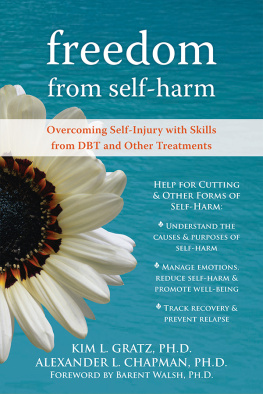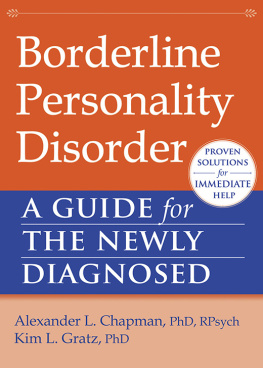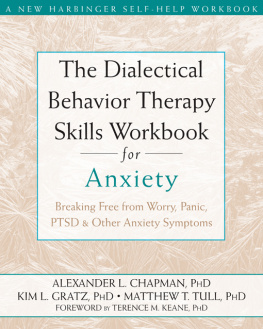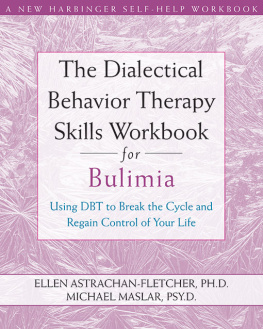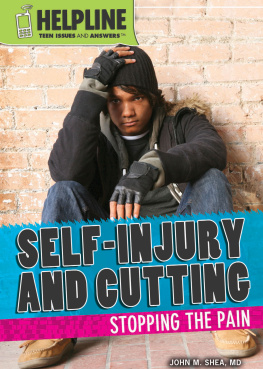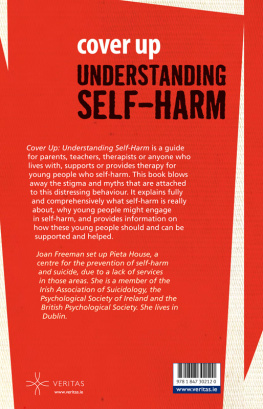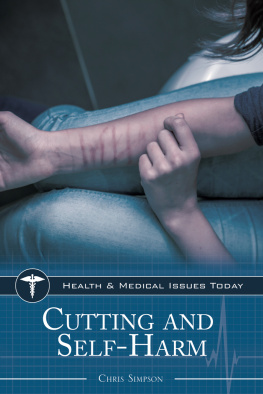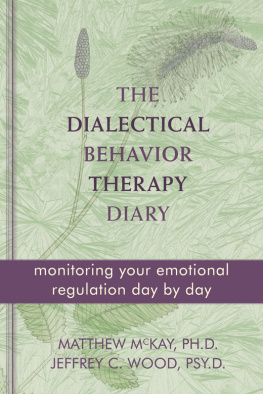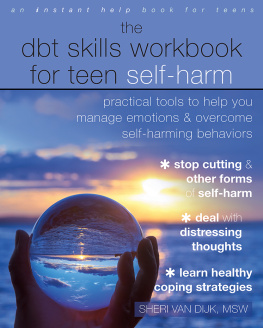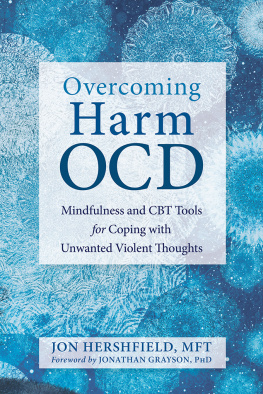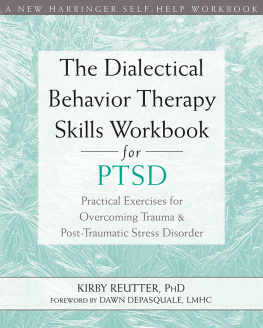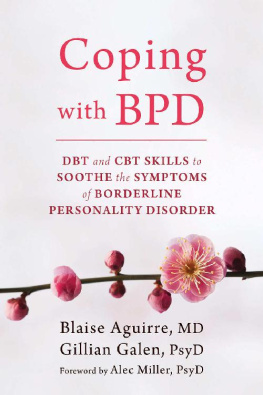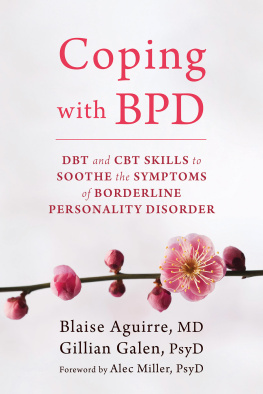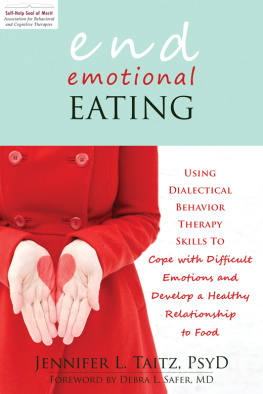Acknowledgments
This book would not have been possible without the love and patience of my husband, courage and strength of my clients, encouragement and support of my mentors, and wisdom and friendship of my coauthor. First and foremost, I would like to gratefully acknowledge the clients whose strength, courage, passion, and struggles with self-harm prompted me to pursue research in this area. Working with them for the past twelve years has been an honor and a blessing. They have been (and continue to be) the inspiration behind my research and treatment development, and have taught me more about self-harm and how to recover from this behavior than anything or anyone else. They truly are survivors in every sense of the word, and I thank them for sharing their lives with me. I am also tremendously grateful to my mentors in graduate school, first Sheree Conrad and then Liz Roemer. They encouraged me to pursue my own interests and gave me the space, freedom, and support to do so. Their encouragement and wisdom are the cornerstones of my career, and Lizs continual mentoring and friendship helps sustain and ground me. Likewise, I will always be grateful to Elizabeth Murphy for her brilliance, wisdom, humor, and friendship. Her passion for her work and respect for mine sustained me for years. My career and life are infinitely better for knowing her.
I have no doubt that this book would not have been written without the contributions of my friend, colleague, and coauthor, Alex Chapman. He is an amazing writer and brilliant researcher and clinician, and I am honored to have had the opportunity to collaborate with him for the past few years. Thanks also to the incredible editorial staff at New Harbinger, especially Catharine Sutker, Jess Beebe, and Nelda Street. Their support throughout this process is much appreciated.
Finally, I am eternally grateful to my parents, Linda and Dave, for their unwavering support and love throughout my life, to Daisy, for her unconditional love, and to my husband and partner (in every sense of the word), Matt Tull. On a very practical level, this book would not have been possible without Matts support, patience, wisdom, and willingness to cook for me many late nights. I cannot begin to express how much I appreciate him and how blessed I am to have him in my life.
Kim L. Gratz
As Kim and I finished up our last book (The Borderline Personality Disorder Survival Guide, New Harbinger Publications, 2007), a new book was the last thing on my mind. But our work together was such a positive experience that I was excited when we started to talk about writing a book that could help people who self-harm. I feel very fortunate to have Kim as a friend and colleague, and I am grateful that Dr. Amy Wagner (back in 2002) suggested that I e-mail one of her colleagues students (Kim), who had research interests similar to my own. Earlier in graduate school, one of my very first clients struggled with self-harm. Through learning about her struggles and navigating my way with the supportive encouragement and guidance of Dr. Richard Farmer, I realized that I wanted to devote my research and clinical work toward helping people who cant see any other way out of their emotional pain. Inspired to continue with this work, I went on internship at Duke to learn more about dialectical behavior therapy (DBT), and I am grateful for all I learned from Drs. Tom Lynch and Clive Robins. Dr. Marsha Linehan, whom I was fortunate to work with as a postdoctoral fellow, has been a wonderful model as a compassionate and brilliant scientist and therapist. I am forever grateful to my clients for allowing me to enter their lives and for teaching me volumes about how to help others who struggle with self-harm. I would like to thank the editorial team at New Harbinger (including Catharine Sutker, Jess Beebe, and Nelda Street) for their invaluable feedback as this book came together. Finally, I feel grateful for the love, support and encouragement of my wonderful wife Katherine, and for my family and my two beautiful sons, Max and Quinn.
Alex Chapman
Kim L. Gratz, Ph.D., is an assistant professor in the department of psychiatry and human behavior at the University of Mississippi Medical Center, where she serves as director of personality disorders research. Gratz has written numerous journal articles and book chapters on borderline personality disorder, deliberate self-harm, and emotion regulation. Her research currently focuses on understanding the nature and consequences of emotion dysregulation and emotional avoidance among individuals who struggle with borderline personality disorder and self-harm. In addition, she has developed a brief emotion regulation group therapy for self-harm among women with borderline personality disorder. In 2005, Gratz received the Young Investigators Award from the National Education Alliance for Borderline Personality Disorder. She is coauthor of The Borderline Personality Disorder Survival Guide.
Alexander L. Chapman, Ph.D., is an assistant professor and registered psychologist in the department of psychology at Simon Fraser University. He is director of the Personality and Emotion Research Laboratory, where he conducts research on self-harm, borderline personality disorder, emotion regulation, and impulsivity. Chapman has published numerous journal articles and book chapters and has given many national and international presentations on borderline personality disorder, dialectical behavior therapy, self-harming and suicidal behavior, and impulsive behavior. In 2007, he received the Young Investigators Award from the National Education Alliance for Borderline Personality Disorder. In addition, he trains students and professionals to treat clients who self-harm or borderline personality disorder. Chapman is president of the Dialectical Behavior Therapy Centre of Vancouver, a center for the treatment of borderline personality disorder, self-harm, and related problems. He is coauthor of The Borderline Personality Disorder Survival Guide.
Foreword writer Barent Walsh, Ph.D., is executive director of The Bridge, a nonprofit human service agency in Worcester, MA. He is an author, consultant, and trainer on the topic of self-injury.
1. What is Self-Harm?
Rebecca sat in her room in the dark wondering what was wrong with her. Why did she keep hurting herself? Why couldnt she stop? She had told herself so many times, This is the last time. I will never do this again. And yet, when things felt out of control and she didnt think she could cope with the pain for a moment longer, she was drawn back in like a moth to a flame. The problem was, in the end, she always felt the same way: ashamed, guilty, and so very alone. Tonight, like so many other nights, she found herself wondering if anyone else struggled with this, or if she really was as crazy and alone as she felt.
Defining Self-Harm
So, what exactly is self-harm? Well, as we mentioned in the introduction, self-harm is something people do purposely to harm themselves physically in the moment, without intending to kill themselves. To give you a better sense of exactly what were talking about, though, well go through each part of this definition in detail below.
The Damage Is Physical
The first part of this definition has to do with injuring yourself physically. There are many things we can do to hurt ourselves psychologically or emotionally, such as saying mean things to ourselves or hanging out with people who dont treat us well. But, these actions dont usually cause physical damage. Self-harm, on the other hand, involves inflicting damage to your body, for example, by causing lacerations, bruises, burns, or scrapes. When someone has self-harmed, you can see the damage. And, in fact, this is one of the reasons people sometimes prefer self-harm to other harmful behaviors that dont leave a mark. Well tell you more about this in chapter 5.

